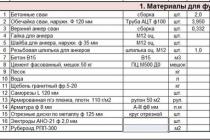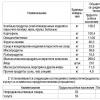Incomes of budgets of all levels budget system Russian Federation are formed in accordance with budget legislation, legislation on taxes and fees, and legislation on other obligatory payments. Budget Code Russian Federation establishes general provisions in the field of formation of budget revenues, assigns certain types of revenues to the budgets of different levels, and also determines the standards for deductions from the revenues of higher budgets to lower ones. Legislation on taxes and fees governs relations on the establishment, introduction and collection of taxes and fees in the Russian Federation, the types of taxes and fees paid to the federal budget, the budgets of the constituent entities of the Russian Federation and local budgets. Legislation on other obligatory payments includes regulatory legal acts establishing the obligation and procedure for paying various types of payments (license, customs, registration, etc.).
Budget revenues are formed from tax, non-tax revenues, as well as gratuitous receipts. Tax income includes income from provided by law on taxes and fees of federal, regional and local taxes and fees, as well as fines and penalties levied for tax offenses provided for by Chapters 16 and 18 of Part I of the Tax Code of the Russian Federation. Taxes, fees and other obligatory payments, as a rule, make up about 90 percent of the funds received by revenue side federal budget.
Non-tax income includes:
1) income received from the use of property in state or municipal ownership, after payment of taxes and fees provided for by law, with the exception of property autonomous institutions, state and municipal unitary enterprises. Such means are:
Rent or other payment for the transfer of state and municipal property for paid use;
funds received as interest on balances budget funds on accounts with the Central Bank of the Russian Federation and credit institutions;
funds received from the transfer of property that is in state or municipal ownership, as a pledge, in trust management;
payment for the use of budget credits;
income in the form of profit attributable to shares in the authorized (share) capital of economic partnerships and companies, or dividends on shares owned by the Russian Federation, constituent entities of the Russian Federation or municipalities;
part of the profit of state and municipal unitary enterprises remaining after paying taxes and other obligatory payments, and other income from the use of property included in state and municipal property;
income from paid services provided budget institutions, after payment of taxes and fees provided for by the legislation on taxes and fees;
income from the sale of property (except for shares and other forms of participation in capital, state reserves precious metals and precious stones), which is in state or municipal ownership;
funds received as a result of the application of measures of civil, administrative and criminal liability, including fines, confiscations, compensations, as well as funds received in compensation for harm caused to the Russian Federation, constituent entities of the Russian Federation, municipalities, and other amounts of forced withdrawal and others not tax income.
Incomes of a budget institution received from entrepreneurial and other income-generating activities are taken into account in full in the estimate of income and expenses of a budgetary institution and are reflected in the income of the corresponding budget as income from the use of state or municipal property, or as income from the provision of paid services. services. A budgetary institution is a state (municipal) institution, the financial support of whose functions, including the provision of state (municipal) services to individuals and legal entities in accordance with the state (municipal) task, is carried out at the expense of the relevant budget on the basis of the budget estimate.
With regard to fines and other amounts of forced withdrawal, the following procedure for enrollment is established. Penalties for violations of the legislation on the fundamentals of the state system of the Russian Federation, on citizenship of the Russian Federation, on public service, on elections and referendums, on conscription and military service, about the State Border, about banks and banking, about the market valuable papers, as well as for violations of antimonopoly, labor, currency, customs, budget legislation (in terms of the federal budget) are subject to transfer to the federal budget in full. The amounts of fines applied as sanctions provided for tax code of the Russian Federation for tax offenses are credited to the relevant budgets according to the deduction standards established by budgetary legislation in relation to the relevant taxes (fees). Sums monetary penalties for administrative offenses in the field of taxes and fees provided for by the Code of the Russian Federation on administrative offenses, are subject to transfer in equal shares to the federal budget and the budgets of municipal districts, urban districts, cities federal significance Moscow and St. Petersburg at the location of the body or official who made the decision to impose a fine. Amounts of confiscations, compensations and other funds forcibly seized into state revenue are credited to budget revenues in accordance with the legislation of the Russian Federation and court decisions.
Gratuitous receipts are funds received in budget revenues in the form of:
subsidies from other budgets of the budgetary system of the Russian Federation. The grant is intergovernmental transfers provided on a gratuitous and irrevocable basis without establishing directions and conditions for their use;
subsidies from other budgets of the budgetary system of the Russian Federation ( intergovernmental subsidies). A subsidy refers to intergovernmental transfers provided to other budgets for the purpose of co-financing spending commitments;
subventions from the federal budget and from the budgets of the subjects of the Russian Federation. A subvention is one of the varieties of interbudgetary transfers provided for the purpose of financial support for the expenditure obligations of the constituent entities of the Russian Federation and municipalities arising from the exercise of the powers of the Russian Federation, transferred for implementation by the authorities of the constituent entities of the Russian Federation and bodies local government;
other interbudgetary transfers from other budgets of the budgetary system of the Russian Federation;
gratuitous receipts from physical and legal entities, international organizations and foreign governments, including voluntary donations.
The Budget Code fixes the own revenues of the budgets of the budget system of the Russian Federation. Own revenues of budgets are types of revenues fixed on a permanent basis in whole or in part for the corresponding budgets by the legislation of the Russian Federation.
Budget revenues include:
tax revenues credited to the budgets in accordance with the budget and tax legislation;
non-tax revenues credited to the budgets in accordance with the legislation of the Russian Federation;
revenues received by budgets in the form of gratuitous and irrevocable transfers (with the exception of subventions from the Federal Compensation Fund and regional funds compensation).
The Budget Code establishes the types of revenues received by the federal budget, the budgets of constituent entities and local budgets, as well as the powers of the Russian Federation, constituent entities of the Russian Federation and municipalities to form revenues.
The federal budget revenues include its own tax revenues, which include federal taxes and fees, customs duties and fees, government duty and other obligatory payments. The composition of non-tax revenues of the federal budget, in addition to general non-tax revenues, includes:
in the amounts established by the Government of the Russian Federation, part of the profits of unitary enterprises established by the Russian Federation;
according to the standards established by federal laws, profit Central Bank Russian Federation;
income from foreign economic activity;
in full - income from the use of property located in state property(with the exception of the property of federal autonomous institutions), income from the sale of such property and income from paid services rendered by federal budgetary institutions.
All listed types of non-tax revenues are accounted for in the federal budget after the payment of taxes and fees and other obligatory payments.
In accordance with Art. 53 of the Budget Code, the powers of the Russian Federation for the formation of budget revenues include:
the establishment of new types of taxes, their cancellation or change is possible only in accordance with the legislation of the Russian Federation on taxes and fees;
federal laws on amendments to the legislation on taxes and fees and federal laws regulating budgetary relations, leading to a change in the revenues of the budgets of the budgetary system of the Russian Federation, must be adopted no later than one month before the date of introduction into State Duma draft federal law on the federal budget for the next fiscal year and planning period
amendments to the legislation of the Russian Federation on federal taxes and fees, which assume their entry into force during the current financial year and lead to a change in budget revenues, are allowed only if appropriate amendments and additions are made to the federal law on the federal budget for the current financial year and planning period.
The composition of the income of the constituent entities of the Russian Federation includes their own tax income, as well as non-tax income and gratuitous receipts.
The powers of the constituent entities of the Russian Federation on the formation of income include the introduction regional taxes and fees, sizing tax rates on them and providing tax breaks within the limits established by the legislation of the Russian Federation on taxes and fees. Laws of the constituent entities of the Russian Federation on amendments and additions to the legislation of the Russian Federation on taxes and fees and laws of the constituent entities of the Russian Federation regulating budgetary legal relations, leading to a change in budget revenues, effective from the beginning of the next financial year (in the next financial year and planning period) , must be adopted before the submission of the draft law on the budget to the legislative (representative) authority of the constituent entity of the Russian Federation.
The revenues of local budgets are formed from their own revenues, as well as from deductions from federal and regional taxes and fees.
The composition of non-tax revenues of local budgets includes income from the use and sale of municipal property (with the exception of property of municipal autonomous institutions and municipal unitary enterprises, including state-owned enterprises), income from paid services provided by municipal budgetary institutions under the jurisdiction of local governments , as well as part of the profits of municipal unitary enterprises remaining after paying taxes and other obligatory payments.
Main characteristics of budgets various levels
The main characteristics of any budget include revenues and expenditures of budgets, as well as the difference between them (deficit / surplus)
I. Revenues of the budget system of Russia.
Budget revenues- funds received by the budget, with the exception of funds that are sources of financing the budget deficit.
In general, budget revenues - economic relations arising in the process of formation of the main national fund Money. The form of manifestation of these relations are different kinds payments of enterprises, organizations and population to the budget.
Budget revenues include tax revenues, non-tax revenues and gratuitous receipts:
1 TO tax revenue budgets include income from taxes and fees provided for by the legislation of the Russian Federation federal taxes and fees, including from taxes provided for by special tax regimes, regional and local taxes, as well as penalties and fines on them. (insert 1)
· TO federal taxes and fees relate:
1) value added tax;
2) excises;
3) income tax individuals;
4) corporate income tax;
5) tax on the extraction of minerals;
6) water tax;
7) fees for the use of objects of the animal world and for the use of objects of aquatic biological resources;
8) state duty.
· TO regional taxes relate:
1) corporate property tax;
2) transport tax.
3) gambling business tax
· TO local taxes relate:
1) land tax;
2) tax on the property of individuals.
2. K non-tax revenue budgets include:
Income from the sale of property in state or municipal ownership;
Income from the use of state or municipal property (for example: rent; funds received in the form of interest on the balance of budget funds; funds received from the transfer of property, pledged, in trust; payment for the use of budget loans; income in the form of profit attributable to shares in the authorized (share) capital of business partnerships and companies, or dividends on shares owned by the Russian Federation, constituent entities of the Russian Federation or municipalities; part of the profit of state and municipal unitary enterprises; etc.);
Income from paid services provided by budgetary institutions;
Funds received as a result of the application of measures of civil, administrative and criminal liability, including fines, confiscations, compensations, as well as funds received in compensation for harm caused to the Russian Federation, constituent entities of the Russian Federation, municipalities, and other amounts of forced withdrawal ;
Receipts from foreign economic activity (customs duties and fees);
Other non-tax income.
3. To donations relate:
- Grants- interbudgetary transfers provided on a gratuitous and irrevocable basis without establishing directions and conditions for their use. The total of subsidies to the budgets of territorial entities (subjects of the Russian Federation and municipalities) from higher budgets forms financial support fund.
- Subsidies- interbudgetary transfers provided for the purpose of co-financing expenditure obligations arising from the exercise of the powers of state authorities of the constituent entities of the Russian Federation and expenditure obligations for the fulfillment of the powers of local governments on issues of local importance.
- Subventions- interbudgetary transfers provided for the purpose of financial support for the expenditure obligations of the constituent entities of the Russian Federation and municipalities arising from the exercise of the powers of the Russian Federation, a constituent entity of the Russian Federation, transferred for implementation to public authorities of a constituent entity of the Russian Federation and local governments in in due course. Subventions to budgets are distributed among all territorial entities according to a single methodology for the relevant type of subventions in proportion to the population size (separate groups of the population), consumers of the relevant state (municipal) services, other indicators, taking into account the standards for the formation of budget allocations for the fulfillment of relevant obligations and objective conditions affecting the cost of state (municipal) services in a particular territorial entity.
Other interbudgetary transfers from other budgets of the budgetary system of the Russian Federation;
Gratuitous receipts from individuals and legal entities, international organizations and foreign governments, including voluntary donations.
Budget Revenue Administrator- public authority, local self-government body, local administration body, management body of the state non-budgetary fund, central bank Russian Federation, budget institution, implementing in accordance with the legislation of the Russian Federation control over the correctness of the calculation, completeness and timeliness of payment, accrual, accounting, collection and decision-making on the return (offset) of overpaid (collected) payments, penalties and fines on them, which are incomes of the budgets of the budgetary system of the Russian Federation;
II. Budget expenditures- funds paid from the budget, with the exception of funds that are sources of financing the budget deficit.
In general, budget spending - uh economic relations arising in connection with the distribution of the fund of state funds and its use. The form of manifestation of these relations are specific types of budget expenditures. According to its material and material embodiment, budget spending represent funds allocated for the financial support of tasks and functions state and local government.
Starting from 2014, budgets of all levels will be formed in a new "program" format based on state or municipal programs. Each state program will link budget allocations to the results of their use to achieve the stated goals. Thus, the program budget is designed to improve the quality of the formation and execution of the main financial document.
State program is a system of activities (interrelated in terms of tasks, deadlines and resources) and tools public policy ensuring, within the framework of the implementation of key state functions, the achievement of priorities and goals of state policy in the field of socio-economic development and security.
The program method of budgeting provides a link between allocated resources and the results of their use, regulates the distribution of budget funds between individual programs, promotes greater efficiency and transparency, as well as increased responsibility and accountability in spending funds.
Chief manager of budgetary funds- a state body, a state non-budgetary fund management body, a local self-government body, as well as the most significant institution of science, education, culture and healthcare, indicated in the departmental structure of budget expenditures, having the right to distribute budget funds between subordinate managers and recipients of budget funds;
The list of the main managers of the funds of the federal budget, the budget of the subject of the Russian Federation, state budgets outside budget funds, the local budget is established by a law (decision) on the relevant budget, consisting of departmental spending structure .
The list and codes of target articles and types of budget expenditures are approved as part of the departmental structure of expenditures by a law (decision) on the budget.
III. Budget deficit - the excess of budget expenditures over its revenues.
One of the principles of the formation of the budget system of the Russian Federation is budget balance principle. It means that the volume of budgeted expenditures must correspond to the total volume of budget revenues and receipts from the sources of financing its deficit.
Budget deficit - a category of money economy, which expresses the objective economic relations that arise between the participants in the reproduction process when the state uses funds in excess of available budget revenues. It follows from this that the main reason for the emergence of the budget deficit lies in the lag in the growth rates of budget revenues compared to the increase in budget expenditures.
If the budget for the next financial year with a deficit is adopted, the relevant budget law is approved sources of financing the budget deficit (for example: loans from credit organizations; government loans carried out by issuing securities on behalf of the Russian Federation; loans and credits from budgets of other levels of the budget system of the Russian Federation, balances in accounts for accounting for budget funds, etc.).
Can not be the sources of financing the budget deficit are loans from the Bank of Russia, as well as the acquisition by the Bank of Russia of debt obligations of the Russian Federation, constituent entities of the Russian Federation, municipalities when they are placed.
The Budget Code of the Russian Federation establishes size limit deficit for each level of the budget of the Russian Federation.
To finance the budget deficit, the state resorts to borrowing, resulting in the formation of state debt.
State or municipal debt - obligations arising from public or municipal borrowing, guarantees for obligations of third parties, other obligations assumed by the Russian Federation, a constituent entity of the Russian Federation or a municipality.
External debt - Liabilities arising in foreign currency.
domestic debt - liabilities arising in the currency of the Russian Federation.
State or municipal guarantee - view debt obligation when the state as guarantor assumes responsibility for the repayment of loans or the fulfillment of other obligations previously assumed by legal entities or individuals.
The budget system of the Russian Federation Fedosov Vitaly Anatolyevich
Question 5 Non-tax budget revenues
Non-tax revenues are an integral part of the own revenues of the budgets of all levels of the budget system of the Russian Federation. In accordance with Art. 41 of the Budget Code of the Russian Federation to non-tax revenue budget include:
income from the use of property in state or municipal ownership,
proceeds from the sale of property(except for shares and other forms of participation in capital, state stocks of precious metals and precious stones), owned by the state or municipality, after payment of taxes and fees provided for by the legislation on taxes and fees, with the exception of the property of autonomous institutions, as well as the property of state and municipal unitary enterprises, including state-owned ones;
income from paid services provided by budgetary institutions, after payment of taxes and fees provided for by the legislation on taxes and fees;
funds received as a result of the application of measures of civil, administrative and criminal liability, including fines, confiscations, compensations, as well as funds received in compensation for harm caused to the Russian Federation, constituent entities of the Russian Federation, municipalities, and other amounts of forced withdrawal;
means of self-taxation of citizens;
other non-tax income.
It should be noted that the gratuitous and non-refundable transfers previously included in non-tax revenues since January 1, 2005 have been separated into an independent group of budget revenues (clause 4, article 41 of the RF BC).
The full composition of non-tax revenues of budgets is determined by the budget classification of the Russian Federation. Since January 1, 2008, income groups and subgroups common for the budgets of the budgetary system of the Russian Federation have been defined by the Budget Code of the Russian Federation. According to budget classification(Article 21 of the RF BC), non-tax income includes:
Income from foreign economic activity;
Income from the use of property in state and municipal ownership;
Payments on use natural resources;
Income from the provision of paid services and compensation of state expenses;
Income from the sale of tangible and intangible assets;
Administrative fees and fines;
Fines, sanctions, damages;
Income of the budgets of the budgetary system of the Russian Federation from the return of the balance of subsidies and subventions of previous years;
Return of balances of subsidies and subventions of previous years;
Other non-tax income.
Unlike tax revenues of the budget, which have rates established by tax legislation, most non-tax revenues, some types of which are in the form of voluntary payments, do not have a permanent fiscal character. In this regard, the planning of non-tax revenues is carried out on the basis of actual revenues for previous periods taking into account changes in legislation, inflation rates and other facts affecting their dynamics.
Since 2005, there has been a sharp increase in the share of non-tax revenues of the federal budget (up to 37%) due to the inclusion of customs duties and fees in their composition (for comparison: in 2002 this figure was 5%, in 2003 - 6%, in 2004 - 8%). Composition and structure of non-tax revenues of the federal budget of the Russian Federation in 2005–2007 are given in table. 4.3.
The structure of federal budget revenues in 2008 includes non-tax revenues in the amount of 2,471.2 billion rubles. (7.09% of GDP), which is 37% of the total income, including:
Table 4.3
Composition and structure of non-tax revenues of the federal budget of the Russian Federation in 2005–2007
Income from the payment of customs duties in the amount of 2124.6 billion rubles;
Income from the use of state-owned property - 89.8 billion rubles;
Payments for the use of natural resources - 42.0 billion rubles;
Income from the provision of paid services and compensation of state expenses - 130.9 billion rubles;
Income from the sale of tangible and intangible assets - 2.0 billion rubles;
Receipt of administrative payments and fees - 4.2 billion rubles;
Receipt of fines, sanctions, compensation for damage - 2.7 billion rubles;
Other non-tax revenues - 1.9 billion rubles.
Thus, most of the non-tax revenues of the federal budget are formed at the expense of income from foreign economic activity (39.1% in 2007). The second and third place in terms of importance belongs to income from the use of state and municipal property (1.7% in 2006; 1.4% in 2007), and income from the provision of paid services and compensation of state expenses (1 .8% in 2006; 1.7% in 2007).
From book budget law author Pashkevich Dmitry From the book Federal Law of the Russian Federation "On general principles organizations of local self-government in the Russian Federation”. Text with amendments and additions for 2009 author author unknown author author unknownArticle 55. Incomes of local budgets
From book municipal law: Cheat sheet author author unknownSection II. BUDGET INCOME
From the book Budget System of the Russian Federation author Fedosov Vitaly AnatolievichChapter 8. BUDGET INCOME OF THE SUBJECTS OF THE RUSSIAN FEDERATION Article 55. Incomes of the budgets of the subjects of the Russian Federation Repealed. - Federal Law No. 120-FZ of August 20, 2004. Article 56. Tax revenues of the budgets of the constituent entities of the Russian Federation (as amended by the Federal Law of August 20, 2004
From the book Budget Code of the Russian Federation. Text with amendments and additions for 2009 author Team of authorsChapter 9. LOCAL BUDGET INCOMES Article 60. Formation of local budget revenues Has become invalid. – Federal Law No. 120-FZ of 20.08.2004. Article 61. Tax revenues of the budgets of settlements (as amended by Federal Law No. 120-FZ of 20.08.2004)1. The budgets of settlements are credited with tax
From the author's book50. Revenues of local budgets The revenue part of local budgets consists of: a) own revenues and receipts; financial assistance in various forms (grants, subventions, funds from the financial support fund for municipalities), etc. To the own income of local
From the author's bookChapter 4 Budget revenues
From the author's bookQuestion 4 Expenses of the budgets of the constituent entities of the Russian Federation and local budgets Increasing importance in economic development countries, the solution of social issues is given to the subjects of the Russian Federation. Accordingly, the requirements for financial support powers of the authorities
From the author's bookSection II. BUDGET INCOME
From the author's bookArticle 47
From the author's bookArticle 51. Non-tax revenues of the federal budget
From the author's bookArticle 57. Non-tax revenues of the budgets of the constituent entities of the Russian Federation
From the author's bookChapter 9. REVENUES OF LOCAL BUDGETS Article 60 Lost
From the author's bookArticle 61
From the author's bookArticle 62. Non-tax revenues of local budgets
1. Budget revenues include tax revenues, non-tax revenues and gratuitous receipts.
2. Tax revenues of budgets include revenues from federal taxes and fees provided for by the legislation of the Russian Federation on taxes and fees, including from taxes provided for by special tax regimes, regional taxes, local taxes and fees, as well as penalties and fines on them.
3. Non-tax budget revenues include:
income from the use of property that is in state or municipal ownership, with the exception of property of budgetary and autonomous institutions, as well as property of state and municipal unitary enterprises, including state-owned, land plots and other objects real estate, federally owned, used Federal Fund development assistance housing construction in accordance with the Federal Law of July 24, 2008 N 161-FZ "On the promotion of housing construction";
income from the sale of property (except for shares and other forms of participation in capital, state reserves of precious metals and precious stones), which is in state or municipal ownership, with the exception of movable property of budgetary and autonomous institutions, as well as property of state and municipal unitary enterprises, including the number of state-owned, land plots and other federally owned immovable property used by the Federal Fund for Assistance to the Development of Housing Construction in accordance with Federal Law No. 161-FZ of July 24, 2008 "On Assistance to the Development of Housing Construction";
income from paid services provided by state institutions;
funds received as a result of the application of measures of civil, administrative and criminal liability, including fines, confiscations, compensations, as well as funds received in compensation for harm caused to the Russian Federation, constituent entities of the Russian Federation, municipalities, and other amounts of forced withdrawal ;
means of self-taxation of citizens;
other non-tax income.
4. Gratuitous receipts include:
subsidies from other budgets of the budgetary system of the Russian Federation;
subsidies from other budgets of the budgetary system of the Russian Federation (interbudgetary subsidies);
subventions from the federal budget and (or) from the budgets of the subjects of the Russian Federation;
other interbudgetary transfers from other budgets of the budgetary system of the Russian Federation;
gratuitous receipts from individuals and legal entities, international organizations and governments of foreign states, including voluntary donations.
5. Income from the use of state or municipal property and paid services rendered by state institutions, funds from gratuitous receipts and other income-generating activities in the course of drawing up, approving, executing the budget and drawing up reports on its execution are included in budget revenues.
6. Regulatory legal acts, municipal legal acts, agreements in accordance with which payments are made, which are sources of non-tax revenues of budgets, must provide provisions on the procedure for their calculation, amounts, terms and (or) on the conditions for their payment.
Commentary on Article 41 of the RF BC
The commented article subdivides all budget revenues into
- tax revenues,
- non-tax income,
- gratuitous receipts
At the same time, paragraph 6 of Article 41 of the RF BC was introduced by Federal Law No. 311-FZ of October 22, 2014, and normative legal acts, municipal legal acts, and contracts must be brought into line with this norm no later than July 1, 2015.
Federal taxes and fees include:
1) value added tax;
2) excises;
3) personal income tax;
5) corporate income tax;
6) tax on the extraction of minerals;
8) water tax;
9) fees for the use of objects of the animal world and for the use of objects of aquatic biological resources;
10) state duty.
Regional taxes include:
1) corporate property tax;
2) gambling business tax;
3) transport tax.
Local taxes and fees include:
1) land tax;
2) tax on the property of individuals;
3) trading fee.
In addition, the Tax Code of the Russian Federation also established special tax regimes which provide for other federal taxes:
1) taxation system for agricultural producers (single agricultural tax);
2) simplified taxation system;
3) the system of taxation in the form of a single tax on imputed income for certain types activities;
4) the system of taxation in the implementation of production sharing agreements;
5) patent system of taxation.
"Actual Problem"
In practice, some institutions believe that since they transfer the relevant income to the budget, such income is not taken into account for income tax purposes. The tax authorities, in turn, believe that the costs incurred from these funds, which are received back by institutions as financing, cannot be taken into account for tax purposes.
However, this position of both institutions and tax authorities is unlawful.
In the Decree of the Federal Antimonopoly Service of the Urals District dated February 6, 2014 N Ф09-14277 / 13, the court partially satisfied the claim tax authority on the recovery from the institution of debt on taxes and fees, including income tax, penalties, fines for non-payment of corporate income tax under paragraph 1 of Article 122 of the Tax Code of the Russian Federation. The court concluded that the fact that the institution, acting in pursuance of paragraph 3 of Article 41 of the RF BC and the relevant provisions federal laws on the federal budget for the corresponding year, transferred income from the provision of security services to the federal budget and then received them as funding, does not relieve him of the obligation to include funds received as payment for services rendered in the taxable income and, therefore, does not deprive the right to take into account the expenses incurred in the implementation of the said activity when calculating income tax.
In the Resolution of the Presidium of the Supreme Arbitration Court of the Russian Federation of April 23, 2013 N 12527/12, the court, satisfying the application of the private security department to invalidate the decision of the tax authority to hold liable for committing tax offense adopted on the basis of the results of the field trip tax audit for 2007-2009, pointed out that the fact that the department, acting in pursuance of paragraph 3 of Article 41 of the RF BC and the relevant provisions of federal laws on the federal budget for the corresponding year, transferred income from the provision of security services to the federal budget and then received them as financing, does not release him from the obligation to include funds received as payment for the services rendered in taxable income and, therefore, does not deprive him of the right to take into account the expenses incurred in the implementation of the said activity when calculating income tax.
"Actual Problem"
According to part 3 of article 41 of the RF BC, income from the sale of property of state and municipal unitary enterprises is not included in budget revenues.
This position is set out in the Resolution of the Tenth Arbitration Court of Appeal dated 27.08.2014 N A41-46176/1.
Consultations and comments of lawyers on Article 41 of the Civil Code of the Russian Federation
If you still have questions on Article 41 of the RF BC and you want to be sure that the information provided is up to date, you can consult the lawyers of our website.
You can ask a question by phone or on the website. Initial consultations are free of charge from 9:00 to 21:00 Moscow time daily. Questions received between 21:00 and 09:00 will be processed the next day.
An important element of the budget device is differentiation of incomes of budgets of different levels on own and regulatory.
Own budget revenues- these are types of income fixed on a permanent basis in whole or in part for the relevant budgets by the legislation of the Russian Federation. The own revenues of budgets include: tax revenues assigned to the relevant budgets by law; non-tax revenues, as well as gratuitous transfers. Financial aid is not own income the corresponding budget.
Regulating budget revenues - federal and regional taxes and other payments, for which the rates of deductions (in %) to the budgets of the subjects of the Russian Federation or local budgets for the next financial year, as well as on a long-term basis (at least 3 years) are set for different types such income. The norms of deductions are determined by the law on the budget of the corresponding level.
Budget revenues are formed in accordance with the budgetary and tax legislation of the Russian Federation. They are formed at the expense of tax and non-tax types of income and at the expense of gratuitous transfers and income of target budget funds. to budget revenues current year the balance of funds at the end of the previous year is credited.
to tax income include federal, regional and local taxes and fees, as well as fines and penalties.
to non-tax income include income from the use and sale of state or municipal property, income from paid services provided by state authorities and local self-government, various fines, pennies, compensation, income in the form of financial assistance received from the budgets of other levels of the budget system of the Russian Federation and etc.
Federal budget revenues
The federal budget revenues include the federal budget's own tax revenues, with the exception of tax revenues transferred in the form of regulatory revenues to the budgets of other levels of the budget system of the Russian Federation. Federal tax revenues include value added tax; excises; customs duties; income tax of enterprises and organizations; personal income tax; contributions to state social off-budget funds; tax on the production of the mineral resource base; subsoil use tax; tax on additional income from hydrocarbon production; fee for the right to use objects of the animal world and aquatic biological resources; forest tax; water tax; environmental tax; state duty; federal license fees.
Non-tax revenues of the federal budget include non-tax revenues common to budgets of all levels (listed above), as well as part of the profits of unitary enterprises and the profits of the Central Bank of the Russian Federation, remaining after paying taxes and other obligatory payments, income from foreign economic activity;














